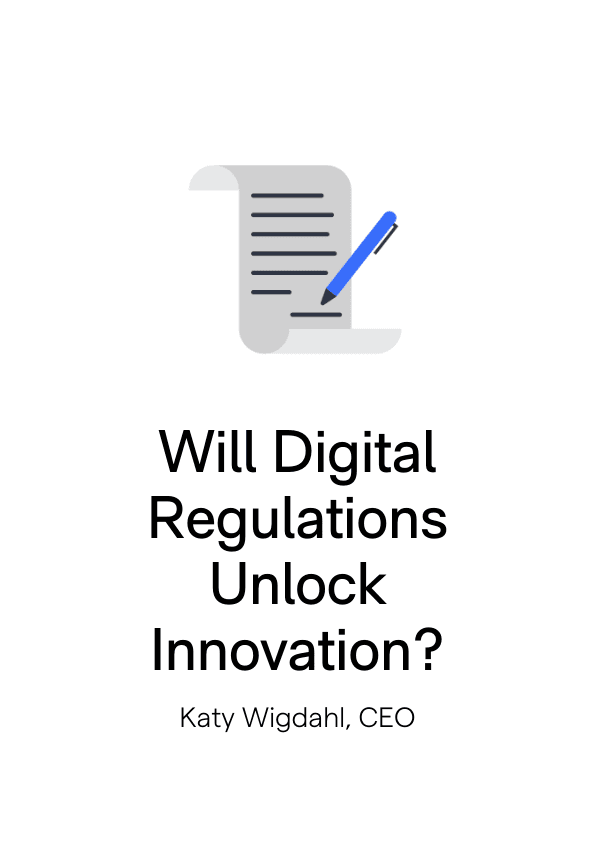May 18, 2022 | Read time 3 min
Will Digital Regulations Unlock Innovation?
Our CEO, Katy Wigdahl, looks at the new digital regulations and what they mean for tech companies of all shapes and sizes.
2022 is fast becoming the year of digital regulation. Earlier this year, the European Commission published a landmark piece of regulation called The Digital Markets Act. In March, the UK Government announced its Plan for Digital Regulation, and last year, the FCC set out further guidelines and rules around Captioning Regulation.
This influx of legislation has caused some quiet – and not so quiet – consternation in certain areas of big tech. Apple argued these new laws created “unnecessary privacy and security vulnerabilities for our users”. While Google was quoted as saying they were, “worried that some of these rules could reduce innovation and the choice available to Europeans.” As the CEO of a fast-growth start-up, I see a different side altogether.
Global Technology. Regional Regulations.
I’m inclined to agree with Cedric O, the French minister for the digital economy who, while explaining the virtues of the DMA, said, “More competition fosters more innovation and this is precisely what will happen. It’s very good news for European innovators and start-ups.” Of course, now the UK is out of the EU it remains to be seen how closely – if at all – the UK follows the DMA.
The UK Government has rightfully said its main focus with the Plan for Digital Regulation is “unlocking innovation”, hopeful that the regulation and governance around tech will help all companies grow, not limit their scope. It’s in keeping with my hope (and one of the theories within the industry) that even the most minimal curbs on some of the giant tech companies will allow the smaller ones more space to grow.
Choosing Greater Choice
One of the biggest areas covered by the DMA is inhibiting the giants from pre-loading apps and software onto their products, disregarding choice and pushing users to take what they’re given – even if something better might be a few clicks away. This limiting of monopoly-by-the-back-door means technology companies like ours – and others have proven to be better than the competition – might be faced with a leg-up rather than a closed door.
After all, it can be a cause of great frustration when you know you have the better product but the gatekeepers are making it hard for people to discover.
Captioning Rules
Another way to look at the rules being introduced around the globe is that they’re looking out for those too often ignored. When it comes to the FCC in the US, rules based on the need to make sure all content comes with closed captions are essential to prevent companies from doing the bare minimum for their viewers.
For example, last year, Pluto.Inc and its parent company ViacomPBS, were fined a not-insignificant amount for failing to provide the necessary captions on their internet-based streaming service. As a company that takes great pride in helping bring accurate subtitles to viewers globally, we can’t do anything but applaud laws which understand how important captioning is.
Of course, introducing any new rules and regulations is a balancing act. Go too far and you risk punishing everyone, don’t do enough and nothing changes. As a company, all we can do is add our expertise to the conversation if, and when, we’re asked. And trust that people are listening.
Katy Wigdahl, CEO, Speechmatics